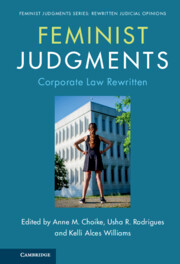Book contents
- Feminist Judgments: Corporate Law Rewritten
- Feminist Judgments Series Editors
- Advisory Panel for Feminist Judgments Series
- Feminist Judgments: Corporate Law Rewritten
- Copyright page
- Dedication
- Contents
- Advisory Panel for Feminist Judgments: Corporate Law Rewritten
- Notes on Contributors
- Acknowledgments
- About the Cover Art
- Table of Cases
- Part I Introduction and Overview
- Part II Legal Personality, Identity, and Limited Liability of Corporate Entities
- Part III Role and Purpose of the Corporation and Corporate Combinations in Society
- Part IV Fiduciary Duties in Corporate Governance
- 8 Commentary on Meinhard v. Salmon
- 9 Commentary on Smith v. Van Gorkom
- 10 Commentary on White v. Panic
- 11 Commentary on Francis v. United Jersey Bank
- 12 Commentary on In re The Walt Disney Co. Derivative Litigation
- Part V Closely Held Businesses and Other Considerations Regarding the Composition of Boards, Management, and Owners
- Part VI Protecting Investors and Potential Investors in Corporations
- Part VII From Foundations to Future Directions
- Index
9 - Commentary on Smith v. Van Gorkom
from Part IV - Fiduciary Duties in Corporate Governance
Published online by Cambridge University Press: 15 January 2023
- Feminist Judgments: Corporate Law Rewritten
- Feminist Judgments Series Editors
- Advisory Panel for Feminist Judgments Series
- Feminist Judgments: Corporate Law Rewritten
- Copyright page
- Dedication
- Contents
- Advisory Panel for Feminist Judgments: Corporate Law Rewritten
- Notes on Contributors
- Acknowledgments
- About the Cover Art
- Table of Cases
- Part I Introduction and Overview
- Part II Legal Personality, Identity, and Limited Liability of Corporate Entities
- Part III Role and Purpose of the Corporation and Corporate Combinations in Society
- Part IV Fiduciary Duties in Corporate Governance
- 8 Commentary on Meinhard v. Salmon
- 9 Commentary on Smith v. Van Gorkom
- 10 Commentary on White v. Panic
- 11 Commentary on Francis v. United Jersey Bank
- 12 Commentary on In re The Walt Disney Co. Derivative Litigation
- Part V Closely Held Businesses and Other Considerations Regarding the Composition of Boards, Management, and Owners
- Part VI Protecting Investors and Potential Investors in Corporations
- Part VII From Foundations to Future Directions
- Index
Summary
In Smith v. Van Gorkom, the Delaware Supreme Court held that corporate directors owe a duty of care to act on “an informed basis, in good faith, and the honest belief that the action taken was in the best interest of the company.” This holding shocked boardrooms everywhere by subjecting directors to the threat of personal liability for gross negligence in decision-making. While legislatures moved swiftly to allow corporations to adopt exculpation clauses relieving directors from these heightened standards, Van Gorkom remains a high-water mark in holding directors liable for their actions. Lua Yuille’s feminist judgment expands Van Gorkom’s reach, focusing on the homogeneity of the all-white male board and resulting in lack of diverse qualities and perspectives. She takes the revolutionary step of only affording the business judgment rule presumption to the decisions of an appropriately diverse board. In her rewritten opinion, the majority’s cramped duty of care is expanded to encompass all stakeholders, not merely shareholders. Virginia Harper Ho contextualizes the feminist judgment and explores possibility of a faith-centered feminism and its relationship to stakeholder-centric governance.
Keywords
- Type
- Chapter
- Information
- Feminist Judgments: Corporate Law Rewritten , pp. 221 - 245Publisher: Cambridge University PressPrint publication year: 2023



